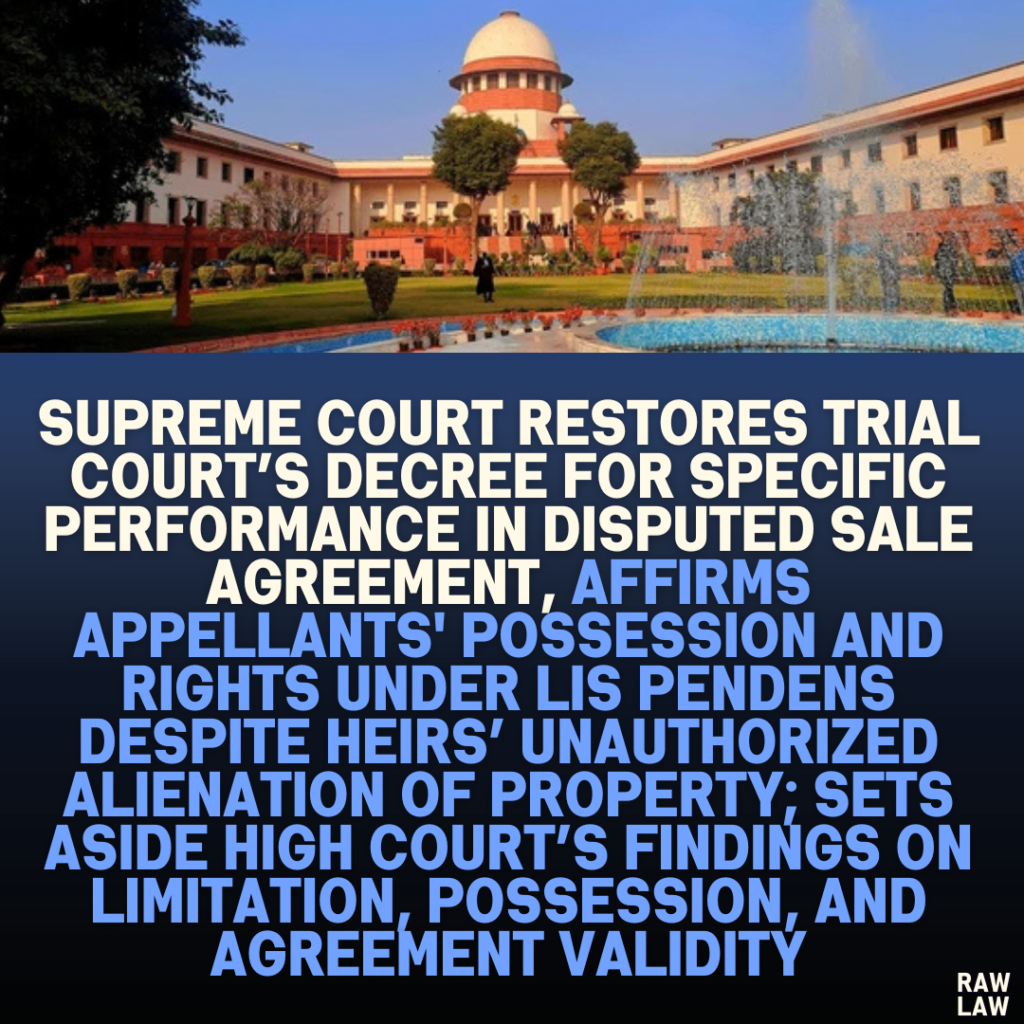Court’s Decision:
The Supreme Court allowed the appeal, reversing the High Court’s judgment and restoring the Trial Court’s decree for specific performance. The Court directed the heirs of the original owner to execute the sale deeds in favor of the appellants, confirming that the agreement to sell was validly executed and enforceable. The Court also declared sale deeds executed in favor of third parties during the pendency of the suit null and void.
Facts of the Case:
- The dispute concerns a suit for specific performance related to 23.98 acres of land originally owned by Sushila Devi, who allegedly entered into a sale agreement with the appellants in 1990.
- The appellants claimed that they paid the full consideration and took possession of the land upon the agreement’s execution. After Sushila Devi’s death, her heirs denied the agreement and refused to execute the sale deed.
- The appellants filed separate suits, seeking specific performance of the sale agreements and an injunction against alienation, which the Trial Court granted.
- Despite the interim injunction, the heirs sold parts of the disputed land to third parties, leading to further legal complexities.
Issues:
- Validity and Execution of the Agreement: Whether the 1990 agreement to sell was valid and enforceable.
- Adverse Inference on Non-Appearance in Witness Box: Whether the plaintiffs’ absence in the witness box should lead to an adverse inference.
- Limitation: Whether the suit was barred under Article 54 of the Limitation Act.
- Doctrine of Lis Pendens: The applicability of the doctrine to the transfers made during litigation.
- Possession and Alleged Forgery: The nature of possession claimed by the appellants and whether the alleged forgery by defendants was sufficiently proved.
Petitioner’s Arguments:
- The appellants argued that the agreement was validly executed and binding on Sushila Devi’s heirs.
- They asserted that the defendants failed to prove any fraud or misrepresentation, especially as their expert could not establish forgery.
- They contested the High Court’s inference of limitation, arguing the cause of action arose upon refusal of execution by the heirs, not at Sushila Devi’s death.
Respondent’s Arguments:
- The respondents argued that the agreement was void, highlighting Sushila Devi’s old age and claimed illiteracy to assert her rights as a pardanashin woman.
- They raised concerns about the appellants’ non-appearance in the witness box, asserting that only those present at the agreement’s execution could testify.
- They maintained that the transfers to third parties during litigation should not be voided outright.
Analysis of the Law:
- Limitation under Article 54: The Court ruled that the suit was timely as the refusal of execution by the heirs triggered the cause of action, making the second part of Article 54 applicable.
- Validity of Agreement and Possession: Based on evidence, including original documents and expert testimony, the Court affirmed the appellants’ possession and payment of full consideration, finding the agreement enforceable.
- Adverse Inference on Non-Appearance: The Court held that testimony from the plaintiffs’ Power of Attorney holders, who had personal knowledge, was sufficient to establish the agreement’s validity.
Precedent Analysis:
- The Court distinguished this case from Thiruvengadam Pillai and Vidyadhar Vishnupant Ratnaparkhi, emphasizing that plaintiffs adequately established their case through competent witnesses and documentation, unlike the situations in these precedents.
Court’s Reasoning:
- Doctrine of Lis Pendens: Transfers made during litigation were subservient to the appellants’ rights, especially given the defendants’ violation of an interim injunction.
- Possession and Readiness: The Court rejected the High Court’s findings on possession, reiterating that the appellants’ actions, including paying land revenue, affirmed their possession and readiness to perform.
Conclusion:
The Supreme Court’s restoration of the Trial Court’s decree emphasizes the binding nature of agreements to sell upon heirs, especially when full consideration has been paid and possession delivered. The Court found the High Court’s conclusions on limitation, witness appearance, and possession erroneous, affirming the appellants’ right to specific performance.
Implications:
This decision underscores the sanctity of contractual obligations in specific performance suits and reaffirms that the burden of proving fraud lies with the party alleging it, especially where original documentation supports validity. Additionally, it reinforces the doctrine of lis pendens in safeguarding parties’ rights against unauthorized third-party transfers during litigation.
